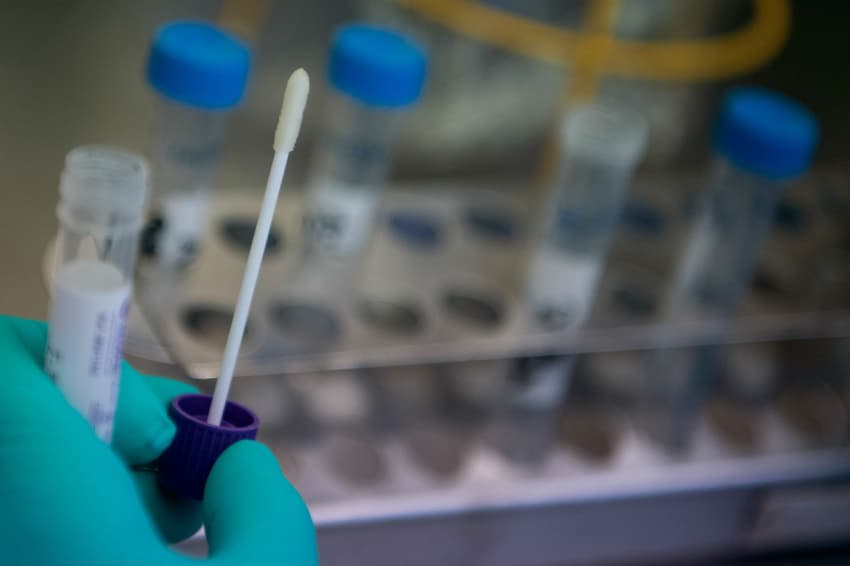Walk-in coronavirus test centre opens at Frankfurt Airport

Frankfurt Airport opened a walk-in
testing centre on Monday where passengers can pay to take a coronavirus test
and get their results within hours, in a bid to reassure anxious travellers as
the summer holidays kick off.
The biotechnology company Centogene, in cooperation with the airport operator Fraport and Lufthansa, launched the project on Monday.
It is expected that, starting immediately and through the end of July 2021, departing and arriving passengers will be able to visit the "Walk-In Test Center" near the main terminal building and the long-distance train station.
A standard test costs €59, with results expected within six to eight hours.
For €139, passengers can opt for a fast-track test that will gave an answer in two to three hours.
The walk-in hub can handle 300 tests per hour.
According to the Berlin-based company, the test center is to be a "blueprint for the opening of international travel".
Results digitally linked to flight tickets
At present, German passengers cannot enter many countries, such as China, directly without having been tested for Covid-19 within 72 hours.
Several German states, as well, require a negative test result for travellers coming from certain regions, such as the current hotspot of Gütersloh.
READ ALSO: Will coronavirus testing before holidays become the norm in Germany?
The test can either be completed the day before traveling, or through a "fast track solution the same day before departure," wrote Centrogen in a press release.
All results would be made available to passengers via a secure digital platform and linked to the flight ticket, said Centogene CEO Arndt Rolfs.
"With the opening of the test center, we are offering our guests a convenient way to test themselves for flights abroad or a stay in Germany to avoid quarantine," said Björn Becker of the Lufthansa Group.
Opening up again
Many European Union countries reopened their borders to European visitors earlier this month, and discussions are ongoing about expanding the list of "safe countries" to accept visitors from, depending on how well non-EU nations are handling the pandemic.
Germany has weathered the COVID-19 crisis better than many of its neighbours, in part thanks to early and widescale testing.
But the country is currently dealing with several virus flare-ups and debate is raging about whether or not to massively ramp up testing.
READ ALSO: 'Nip the virus in the bud': How Germany showed Europe the way in coronavirus testing
The southern state of Bavaria announced plans at the weekend to test all its residents for the virus, in what state premier Markus Söder called an "offensive" action and "the only serious option" to break the chain of infections.
But German Health Minister Jens Spahn criticised the plan, saying it could lead to a false sense of security and put unnecessary strain on testing capacity.
"Testing a lot sounds good," he tweeted, "but it's not useful without a purposeful approach.
Comments
See Also
The biotechnology company Centogene, in cooperation with the airport operator Fraport and Lufthansa, launched the project on Monday.
It is expected that, starting immediately and through the end of July 2021, departing and arriving passengers will be able to visit the "Walk-In Test Center" near the main terminal building and the long-distance train station.
A standard test costs €59, with results expected within six to eight hours.
For €139, passengers can opt for a fast-track test that will gave an answer in two to three hours.
The walk-in hub can handle 300 tests per hour.
According to the Berlin-based company, the test center is to be a "blueprint for the opening of international travel".
Results digitally linked to flight tickets
At present, German passengers cannot enter many countries, such as China, directly without having been tested for Covid-19 within 72 hours.
Several German states, as well, require a negative test result for travellers coming from certain regions, such as the current hotspot of Gütersloh.
READ ALSO: Will coronavirus testing before holidays become the norm in Germany?
The test can either be completed the day before traveling, or through a "fast track solution the same day before departure," wrote Centrogen in a press release.
All results would be made available to passengers via a secure digital platform and linked to the flight ticket, said Centogene CEO Arndt Rolfs.
"With the opening of the test center, we are offering our guests a convenient way to test themselves for flights abroad or a stay in Germany to avoid quarantine," said Björn Becker of the Lufthansa Group.
Opening up again
Many European Union countries reopened their borders to European visitors earlier this month, and discussions are ongoing about expanding the list of "safe countries" to accept visitors from, depending on how well non-EU nations are handling the pandemic.
Germany has weathered the COVID-19 crisis better than many of its neighbours, in part thanks to early and widescale testing.
But the country is currently dealing with several virus flare-ups and debate is raging about whether or not to massively ramp up testing.
READ ALSO: 'Nip the virus in the bud': How Germany showed Europe the way in coronavirus testing
The southern state of Bavaria announced plans at the weekend to test all its residents for the virus, in what state premier Markus Söder called an "offensive" action and "the only serious option" to break the chain of infections.
But German Health Minister Jens Spahn criticised the plan, saying it could lead to a false sense of security and put unnecessary strain on testing capacity.
"Testing a lot sounds good," he tweeted, "but it's not useful without a purposeful approach.
Join the conversation in our comments section below. Share your own views and experience and if you have a question or suggestion for our journalists then email us at [email protected].
Please keep comments civil, constructive and on topic – and make sure to read our terms of use before getting involved.
Please log in here to leave a comment.